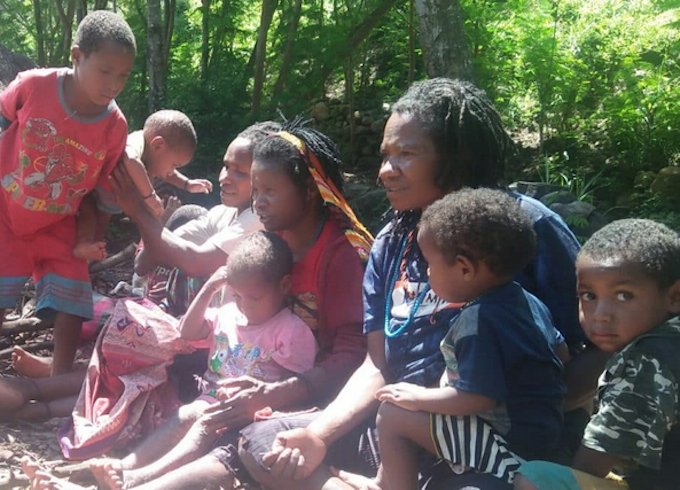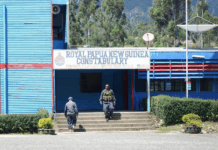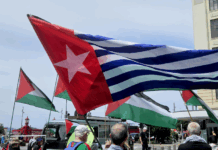
By Benny Mawel in Jayapura
“Merry Christmas, 25 December 2020,” says the graffiti displayed in the yard of the Nduga student dormitory in the study city of Jayapura.
Hundreds of eyes stared at the writing, then they moved forward lighting Christmas candles.
“We want Christmas light,” said Arim Tabuni, a senior student who attended the joint event.
Arim is one of Nduga’s students. He looked thin, like never before. Now he walks slowly and bent a little.
“I was sick but came to light a candle. We want to continue to ignite the light of truth in our hearts,” he said softly, with a slight frown.
He is still sick from the beatings of Indonesian security forces when he broke up a peaceful student demonstration in Jayapura city. The assault was inflicted on him on 2 May 2016.
Beside him, Bheny Murib sat down, occasionally staring at the theme. He ignored his turn to light the candle. He just sat there until the event was over.
Stories of refugees
Apparently, Murib was mumbling stories of refugees in Nduga. He has lost the momentum of the joys of Christmas since 2018. Parents, younger siblings, and brothers left their house to the forest to neighbouring districts such as Lanny Jaya, Puncak, Asmat, Yahukimo and Jayawijaya (Wamena).
He remembered house, honai (traditional house of indigenous West Papuans), the church is quiet. There is no puff of burning smoke celebrating Christmas together in the church yard.
Nduga students from various study cities cannot go home on holiday like before.
“We wanted to celebrate Christmas with our parents at home, but these two years have all disappeared,” said Murib.
To remember that, Nduga students in Jayapura celebrate Christmas in the dormitory yard.
“Usually there is a large dormitory hall but today it is on this courtyard,” he said, looking at the baby Jesus Christmas manger lying down.
it reminded him of the birth of children in Nduga. Mothers were forced to give birth in forests and caves.
Birth in the forest
Gelina Lilbid is one of the names of the women she remembers giving birth in the forest.
Lilbid is the wife of an uncle. Gelina gave birth on her way to flee from Yigi, Nduga, to Kyawagi, Lanny Jaya and on to Wamena.
Murib told the story of the birth of a child who was named Pengungsiana Kelenea.
According to the story of Gelina Lilbid: “I gave birth to a child in the middle of the forest on 4 December 2018.
“A lot of people thought my son was dead. It turned out that my child was still breathing.
“My child is sick, has difficulty breathing and has a cough with phlegm. It was very cold in the forest, so when we walked again, I felt that my baby had not moved.
“We thought he was dead. The family had given up. A family asked me to throw my child away because it was thought he was dead.
“But I still love and carry my child. Yes, if you really die, I have to bury my child properly even in the forest.
“Because I kept carrying my baby, my brother made a fire and heated the tree leaves, and the heated leaves he stuck them all over my baby’s body.
“After the brothers put the heated leaves on the fire, my baby breathed and drank breast milk. We went on a trip.
“We were very scared because the TNI continued to shoot at our hiding place. We continued to walk in the forest, and we searched for a cave that we could hide in.
“I was carrying my child having just arrived from Kuyawagi, Lanny Jaya Regency in Wamena. We have been in Kuyawagi since the beginning of December 2018.
“Before going to Kuyawagi, we lived in the forest without eating enough food. We are very hard and suffering on our own land,” said Murib recounting Gelina Lilbid’s story.
Refugee babies fleeing
Refugee babies have fled with their parents, now in Jayawijaya (Wamena) district, since 2018. Refugees are now two years old in December 2020.
There were two other children who were born on the way to the evacuation. Their names are Wene Kelenea and Larinus Kelenea.
Wene is a word in the language of the Lani tribe, Yali and Huwula which means story, news, problems, confrontations, conflicts with one another.
If the names are sorted into Wene, Larinus, Refugees. Because of the confrontation and conflict, they had to flee.
He said his family were in refugee camps, children had to be born on the evacuation trip. It just passed. Everyone looks silent, takes it for granted, as if there is no conflict.
“When will the Indonesian government, churches and the United Nations pay attention to our human rights,” he said.
“If they cannot respect human rights, cannot take care of the fate of the Nduga people, all parties must admit that the Nduga people want to take care of themselves.”
“Stop military operations in the Nduga region and give the West Papuan nation sovereign rights,” wrote the Nduga students, among the flickering candles on their dormitory grounds.
This article was translated by a Pacific Media Watch correspondent from the original report.















































